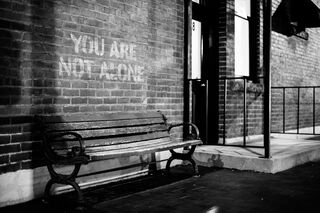Health
Stigma and Abstaining From Mental Health Treatment
Right now, the phrase “it’s ok to not be ok” should be emphasized to everyone.
Posted March 5, 2022 Reviewed by Vanessa Lancaster
Key points
- The pandemic and war in Ukraine add to everyday life's stress, sadness, and difficulties.
- Stigma is the primary reason people either abstain from treatment or drop out of treatment early.
- Support groups can help with feeling stigmatized. They advocate for mental health, offering community awareness and education.

Right now, the phrase “it’s ok to not be ok” should be emphasized to everyone. The pandemic and war between Russia and Ukraine have added to everyday life's stress, sadness, and difficulties.
In his book Science Over Stigma: Education and Advocacy for Mental Health, Daniel Morehead stated that numerous polls now show that people believe mental health is real, treatable, as important as physical health, and nothing to be ashamed of. Although these polls have reflected a positive view of mental health and addiction in our society, the reality is that stigma continues to be a primary reason why people either abstain from treatment or drop out of treatment early.
Morehead further stated that less than half of those diagnosed with a mental health condition or addiction get the treatment they need. For those who get treatment, many do not adhere to it and drop out. There are many reasons why individuals do not seek the help they need, such as financial concerns for treatment, access to treatment, transportation to and from therapy, and not having the means to have access to telehealth in the home.
In my presentations and workshops regarding stigma, mental health, and addiction, I ask the attendees to vocalize some of the stigmatizing statements said to those with mental health concerns and/or addiction. Examples include being weak, a loser, a failure, etc. This reflects social (public) stigma, a negative perception, and beliefs toward an individual or group of people.
Then we look at self-stigma, which occurs when those impacted by mental health concerns or addiction internalize negative society beliefs and labels. This is a big part of why so many people try to ignore, push through alone, or hide their mental health and addiction. In these cases, people often hope it goes away, or they try to manage these concerns alone. You are not alone!
Helpful Tips:
- If you hear someone say disparaging things about someone who has mental health concerns and/or addiction, first take a deep breath. For many, anger or sadness can be overwhelming, specifically if they say things that directly impact you.
Know that they may say this because they are struggling, and they make these kinds of statements to create distance between their thoughts and the help they need. Alternatively, they may lack understanding and knowledge regarding mental health concerns, addiction, and recovery.
- Therapy. If you can financially move forward with treatment, this is something that you should be very proud to do. Therapy does not have to be sought as a reaction to a situation or problem. It can be part of preventive care, adding to strengthening coping skills and problem-solving skills. If you have tried therapy in the past and did not have a great experience, please do not give up. Keep looking until you find the right therapist for you. It could be a game-changer.
I often use the following situation as an example. If I go to a restaurant and have a bad meal or bad service, I may not go back to that restaurant, but I will continue to go to different restaurants. The same can be said about therapy. You may have an unpleasant experience, but instead of saying, “I am done; therapy is not for me,” continue until you find the right one for you. There are so many excellent therapists and psychologists out there waiting for you to contact them.
- Support groups. If you are struggling with mental health concerns and/or addiction, numerous support groups are available. Support groups are often free to attend. Whether you are looking at 12-step support groups for addiction, groups focused on anxiety, depression, grief and loss, and others. These groups can help alleviate feeling alone and disconnected while strengthening how you feel about being part of a mental health/addiction recovery group.
- National Alliance on Mental Illness (NAMI). As mentioned above regarding support groups, NAMI offers many support groups for individuals and families impacted by addiction and mental health concerns. These groups are free and often available in-person and on a web-based platform. In addition to support groups, they advocate for mental health, offering community awareness and education. They provide numerous events focused on reducing stigma and increasing connection and support for those impacted by mental health concerns and addiction.
- Lastly, contrary to the negative comments you hear due to mental health stigma, people who are working to improve their mental health are resilient, strong, and empowered!
To find a therapist, visit the Psychology Today Therapy Directory.
References
Morehead, D. B. (2021). Science Over Stigma: Education and Advocacy for Mental Health. American Psychiatric Association Publishing.


